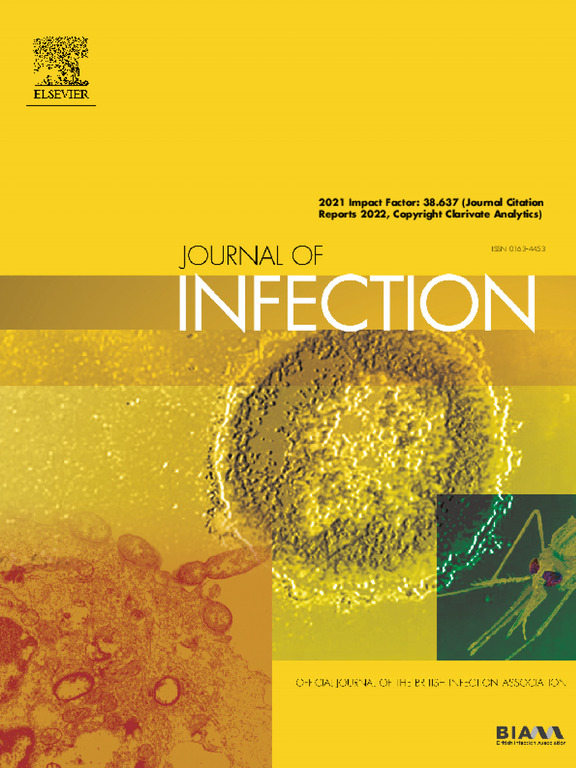COVID-19 接种前和接种后的平台试验(PICOBOO):对 50-<70 岁年龄段的 AZD1222 接种者接种不同 COVID-19 疫苗作为第二针加强剂(第四针)的免疫原性、反应原性和安全性。
IF 14.3
1区 医学
Q1 INFECTIOUS DISEASES
引用次数: 0
摘要
试验目的PICOBOO 是一项随机适应性试验,旨在评估 COVID-19 强化策略的免疫原性、反应原性和安全性。我们报告了在 50 人中进行第二次强化的数据:免疫功能正常的成年人在接受任何首次强化治疗 > 三个月之前均符合条件。参与者以 1:1:1 的比例随机分配到 BNT162b2、mRNA-1273 或 NVX-CoV2373。祖先抗尖峰免疫球蛋白的浓度汇总为几何平均浓度(GMC)。反应生成性和安全性结果均有记录。对一个子集进行了包括中和抗体在内的额外分析。ACTRN12622000238774.Results:2022年3月至2023年8月期间,共招募了743名参与者并采集了D28样本;其中155人属于50-结论组:所有疫苗都具有免疫原性,mRNA 疫苗的免疫原性减弱更快。这些数据支持使用对循环中的 Omicron 亚变体具有更强特异性的疫苗来增强免疫力。本文章由计算机程序翻译,如有差异,请以英文原文为准。
The Platform Trial In COVID-19 Priming and BOOsting (PICOBOO): The immunogenicity, reactogenicity, and safety of different COVID-19 vaccinations administered as a second booster (fourth dose) in AZD1222 primed individuals aged 50-<70 years old
Objectives
PICOBOO is a randomised, adaptive trial evaluating the immunogenicity, reactogenicity, and safety of COVID-19 booster strategies. We report data for second boosters among individuals 50-<70 years old primed with AZD1222 (50-<70y-AZD1222) until Day 84.
Methods
Immunocompetent adults who received any first booster ≥three months prior were eligible. Participants were randomly allocated to BNT162b2, mRNA-1273 or NVX-CoV2373 1:1:1. The concentrations of ancestral anti-spike immunoglobulin were summarised as the geometric mean concentrations (GMC). Reactogenicity and safety outcomes were captured. Additional analyses including neutralising antibodies were performed on a subset. ACTRN12622000238774.
Results
Between Mar 2022 and Aug 2023, 743 participants were recruited and had D28 samples; 155 belonged to the 50-<70y-AZD1222 stratum. The mean adjusted GMCs (95% credible intervals) were 20,690 (17 555−23 883), 23,867 (20 144−27 604) and 8654 (7267−9962) U/mL at D28 following boosting with BNT162b2, mRNA-1273 and NVX-CoV2372, respectively, and 10,976 (8826−13 196), 15,779 (12 512−19 070) and 6559 (5220−7937) U/mL by D84. IgG against Omicron BA.5 was 2.7–2.9 times lower than the ancestral strain. Limited neutralisation against Omicron subvariants was found following all vaccines. Severe reactogenicity events were <4%.
Conclusions
All vaccines were immunogenic with more rapid waning after mRNA vaccines. These data support boosting with vaccines with greater specificity for circulating Omicron subvariants.
求助全文
通过发布文献求助,成功后即可免费获取论文全文。
去求助
来源期刊

Journal of Infection
医学-传染病学
CiteScore
45.90
自引率
3.20%
发文量
475
审稿时长
16 days
期刊介绍:
The Journal of Infection publishes original papers on all aspects of infection - clinical, microbiological and epidemiological. The Journal seeks to bring together knowledge from all specialties involved in infection research and clinical practice, and present the best work in the ever-changing field of infection.
Each issue brings you Editorials that describe current or controversial topics of interest, high quality Reviews to keep you in touch with the latest developments in specific fields of interest, an Epidemiology section reporting studies in the hospital and the general community, and a lively correspondence section.
 求助内容:
求助内容: 应助结果提醒方式:
应助结果提醒方式:


